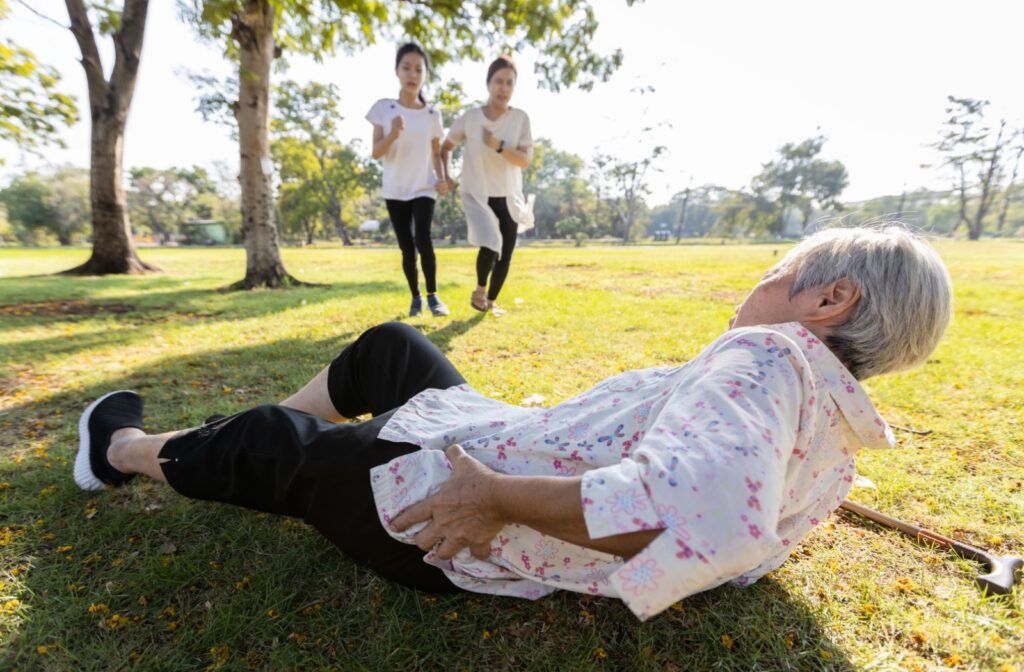When a senior loved one suffers a hip fracture, most family caregivers focus on the immediate physical recovery. However, did you know such an injury could also impact their cognitive health? Due to the trauma, pain, and potential functional decline because of a hip fracture, there is a strong correlation to an increased risk of cognitive impairment.
Fortunately, there are plenty of ways to help your loved one combat these risks, such as occupational therapy, encouraging mobility and socialization, or getting help from a senior living community.
Understanding Hip Fractures in Seniors
A hip fracture is a serious and increasingly common issue among seniors, particularly those over the age of 65. According to the CDC, more than 300,000 seniors are hospitalized annually due to hip fractures, often caused by falls. Aging bones, weakened by osteoporosis, combined with poorer balance, elevate the risk for these life-altering injuries.
However, the impact of a hip fracture often extends beyond physical health. The injury triggers a ripple effect for many seniors, influencing their cognitive state, emotional well-being, and overall independence.
How a Hip Fracture Can Contribute to Cognitive Decline
The challenge lies in how a hip fracture exacerbates existing problems tied to both physical and mental health.
- Pain and discomfort: Chronic pain associated with hip fractures can lead to stress and lack of focus, further impairing cognitive function over time.
- Immobility and reduced brain stimulation: When mobility decreases significantly, healthy blood flow and mental stimulation decline. This can increase feelings of “mental fog” or confusion.
- Medication and anesthesia side effects: Post-surgical medications, particularly in seniors, sometimes contribute to short-term cognitive side effects, including forgetfulness or confusion. Prolonged use of narcotics or sedatives can amplify this risk.
- Hospital and nursing home delirium: For seniors, hospital stays or unfamiliar care environments increase susceptibility to delirium, a sudden and severe decline in mental function often triggered by stress, sleep disruption, or dehydration.
Preventing Cognitive Decline After a Hip Fracture
While the potential risks are concerning, the good news is that early intervention and a proactive recovery plan significantly reduce the likelihood of cognitive decline after a hip fracture. Here’s how you, as a family caregiver, can take action.
1. Early Intervention Matters
Time is crucial. Rehabilitation should start as soon as the senior is medically cleared. This could mean gentle movements or physical therapy in the immediate post-surgery stage. Early mobilization improves physical and cognitive outcomes by jumpstarting circulation and brain engagement.
2. Design a Comprehensive Recovery Plan
A recovery plan should focus on restoring both physical health and mental sharpness. Collaborate with healthcare professionals to create a detailed rehabilitation roadmap that includes personalized therapy, balanced nutrition, and consistent check-ins to evaluate progress.
3. Physical & Cognitive Exercises
Simultaneously targeting the body and the brain yields the greatest results in recovery. For example, pairing light walking or stretching with activities like puzzles, memory games, or even learning a new skill stimulates multiple areas of brain function.
Simple things like following a recipe or playing music while moving can bridge the gap between physical movement and mental stimulation.
4. Occupational Therapy
Occupational therapy promotes independence by helping seniors relearn everyday tasks like dressing, cooking, or using assistive devices. Mastering these tasks provides a sense of accomplishment, boosting self-esteem while keeping the brain engaged.
Professional therapists often integrate physical exercises alongside cognitive challenges, tailoring activities to suit individual recovery needs.
The Role of Mobility in Cognitive Health
Physical activity and cognitive health are tightly interwoven. Mobility fosters physical independence and actively supports brain health in various ways.
Brain Stimulation Through Movement
Exercise stimulates blood flow to the brain, promoting the release of brain-derived neurotrophic factor (BDNF), a protein crucial for neural growth and resilience. Regular movement strengthens the brain’s ability to process information, focus, and store memories. Physical activity’s role in neuroplasticity—the brain’s capacity to adapt and heal—cannot be overstated.
When mobility is restricted after a hip fracture, this crucial brain stimulation diminishes, leaving seniors vulnerable to experiencing slower mental processing and memory decline.
Social Isolation & Its Effects
Mobility isn’t just about moving independently—it also allows seniors to stay socially active. Attending events, meeting friends, or even casually chatting at the grocery store keeps the mind sharp. However, after a hip fracture, mobility challenges often lead to social isolation, a key risk factor in cognitive decline.
Studies show that people experiencing prolonged loneliness or isolation are more likely to develop dementia and other cognitive impairments. Therefore, a hip fracture can create risks if physical recovery isn’t supported effectively.
How Senior Living Communities Support Recovery
Recovering from a hip fracture can be overwhelming for both seniors and their caregivers. Senior living communities can provide significant support by offering structured environments that promote physical, social, and emotional well-being.
Comprehensive Therapy Programs

Senior living communities often offer on-site physical and occupational therapy programs, which means seniors receive consistent care without transportation challenges. Therapy can help individuals meet recovery milestones while keeping them motivated.
Social Opportunities
Recovering in a senior living community reduces the risk of social isolation. Residents are encouraged to participate in group activities or wellness programs, which foster friendships and keep the brain engaged.
These opportunities are vital for social and emotional healing, from painting classes to book discussions.
Nutritious Meals & Balanced Lifestyles
Nutrition plays a significant role in both physical recovery and brain health. Our senior living community provides delicious chef-prepared meals designed to meet dietary needs, reducing the burden on family caregivers and ensuring consistent, high-quality nutrition.
Supporting Seniors Beyond the Fracture
Meadowcrest at Middletown understands that while hip fractures can feel like a significant setback, dedicated care and family support can reverse the situation. Encourage your loved one to remain as active as possible, both physically and mentally, while taking advantage of the available resources, such as professional therapy and community-based recovery options.
Contact us today to see how our community can support your loved one’s recovery from a hip fracture.





